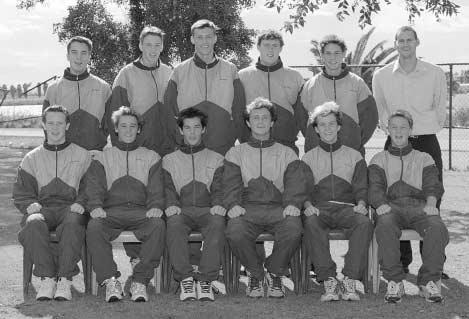
3 minute read
Religious Education Report
Religious Education
As an Edmund Rice educational community, Trinity College hopes its students will “experience learning and living fully integrated in the light of faith” throughout all aspects of their lives here. The Religious Education Department plays an important roleMr Gerard Theseira Dean of Religious Education in helping students achieve this goal. Trinity’s Religious Education Department provides a required five-year program for all students. The members of the department recognise that students come to Trinity from diverse religious backgrounds, and make no presumptions about the religious knowledge or practice our students bring with them. Weteach Religious Education courses as part of the academic curriculum, with corresponding academic requirements. Faith in God through Jesus Christ is a grace, a free gift from God. It is not the purpose of the Religious Education Department to convince students of certain truth or doctrines, or to make them into adult believers. Many students are not ready for an adult faith commitment. Some are closer to this point than others are, but most have many questions to ask. As they search for answers, the Religious Education teachers function as guides and helpers. As a Catholic school, the focus of Trinity’s Religious Education program is on Roman Catholicism. The purpose of our program is not to indoctrinate students. Rather, we hope to serve each student in his own religious quest and to provide the opportunity for students to explore their own religious traditions and beliefs. The academic nature of this program distinguishes it from other types of religious formation that take place in our school and in the individual student’s faith community. These other types of religious formation are found in: Campus Ministry, Christian Service and
The Chaplaincy.
A detailed outline of the program follows: Understanding Catholic Christianity offers our Year Eight students an overview of Catholicism. This course serves as a foundation for the other high school Religious Education courses and faith formation experiences they will have. It also provides a common vocabulary for articulating the essentials of Catholic teaching. This course was developed using the Catechism of the Catholic Church as a primary source. The course does not assume a Catholic background or a committed faith in the students, but can bring Catholic and non-Catholic young people alike to a deeper appreciation of Catholicism’s beliefs, rituals, moral vision, and prayer life – and how that rich heritage can relate to their young lives. Jesus of History, Christ of Faith invites our Year Nine students to understand Jesus through a study of the New Testament. The course first considers the New Testament as a whole, particularly the Gospels, and moves to the Jewish historical, religious, and cultural world into which Jesus was born. Using the Gospels as primary sources the course explores Jesus’ birth, early life, and ministry; his preaching of the Kingdom of God; his special teachings, particularly the parables; and his miracles. It then focuses on the scriptural accounts of his death and Resurrection, the Ascension, and Pentecost, and their central significance for the Church’s understanding of Jesus as the Christ, the Son of God. The course then explores Paul’s missionary work and how his Epistles develop major themes in his theology. The course closes with an overview of the development of Christology after the New Testament to the present.
Living Justice and Peace:
Catholic Social Teaching in Practice is a course that teaches our Year Ten students about how the Scriptures and Catholic social teaching call them to justice. This course fosters the students’ ability and desire to respond to that call. The Year Eleven course Growing in Christian Morality focuses on the development of virtue and character. It helps students raise the important question, “What kind of person am I becoming?”, and “what kind of person do I want to become?” The course then offers a Christian vision for answering this question, centring on Jesus as the model of full humanness and presenting the Tradition of Catholic church teaching on contemporary moral issues.










